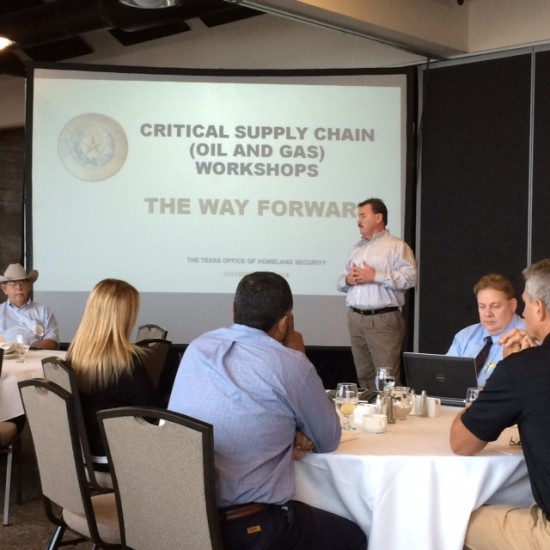In the autumn of 2015, the State, Local, Tribal, Territorial Government Coordinating Council (STTGCC) and the Department of Homeland Security, working in coordination with the Texas Office of Homeland Security and the Texas Oil and Gas Association, conducted a pilot program of Critical Supply Chain Workshops for the oil and natural gas industries in Texas.
Four workshops were conducted at venues across the State of Texas, each attended by 50 to 80+ public- and private-sector stakeholders, criminal intelligence analysts, law enforcement, and emergency management personnel. These workshops were hosted locally in Midland, by the Permian Basin Regional Planning Commission; in Corpus Christi, by the Nueces County Office of Emergency Management; in El Paso, by the Rio Grande Council of Governments; and in Houston, by the University of Houston’s Center for Logistics and Transportation.
Objectives. The objectives of the Critical Supply Chain Workshops were to:
- Improve the resilience of the supply chain to natural and technological hazards and human-caused threats;
- Clearly define the industry supply chain to establish a threshold of knowledge and understanding between industry and government representatives;
- Identify and begin to address operational security and resilience concerns to the supply chain as voiced by private and public sector stakeholders;
- Facilitate joint planning and communication amongst local and regional owners/operators, and state and local EMCs (Emergency Management Coordinator) relevant to the supply chain;
- Build relationships at local/regional level; and
- Develop resources that build training, promote standards, and support local Subject Matter Experts
Pilot Program. These Critical Supply Chain (Oil and Gas) Workshops were a significant departure from similarly named Critical Supply Chain Workshops as conducted by DHS in the past. This was a pilot program, developed by the SLTTGCC as a template for the detailed examination of any identified supply chain.
Focus on Operational Concerns. So as to be of utmost value to private-sector stakeholders, the workshops focused on the identification of operational concerns to the security and resilience of the supply chain. Topics that do not address operational concerns pertinent to the critical infrastructure supply chain will be eliminated.
Criteria for Success. The criterion for success is not the fact that a workshop was conducted nor is it the number of workshops held. “Success” is achieved when private-sector representatives partner with their government counterparts to identify, mitigate and/or eliminate threats to the identified critical infrastructure supply chain.
Reduction in Scope. The pilot workshops were tailored to one (energy) sector rather than past attempts to cover all 16 critical infrastructure sectors in a day. Yet, notable attention was paid during the course of the initiative to the Transportation and Information Technology (cyber security) sectors due to their integration with and impacts upon the oil and gas supply chains.
Progressive and Sequential. The workshops were designed to be progressive and sequential in nature, beginning at source locations (upstream) in the Permian Basin (Midland, Texas) and Eagle Ford Shale and off shore drilling (Corpus Christi, Texas) with subsequent workshops scheduled in turn at refinery locations (midstream) in Houston and El Paso, Texas, and finally at out-of-state distribution center (downstream) locations.
Regional Resilience Assessment Program (RRAP). The workshops sought to integrate observations and trends found in the 2015 Permian Basin Regional Resilience Assessment Program. Working through the DHS Office of Infrastructure Protection’s Protective Security Coordination Division, future workshops may also be able to present relevant information derived through other industry-related RRAPs.
Information Sharing. A deliberate effort was made to capture information gained and operational issues raised at each workshop so as to present this information and share non-proprietary data at subsequent workshop sessions.
HSEEP Compliant. In order to qualify for the use of Homeland Security Grant Program funding in the future, the workshops were planned and conducted in alignment with the Homeland Security Exercise and Evaluation Program (HSEEP).
Roles. The Texas Office of Homeland Security led in planning and coordination of the events, working in close coordination with the Texas Oil and Gas Association. In future critical supply chain workshops, the roles of DHS, state agency sponsors, and local jurisdictions should be defined as follows:
- Department of Homeland Security
- Coordinate selection of critical supply chain (post-pilot)
- Solicit involvement Nationwide
- Facilitate sharing of information between parallel supply chains
- Facilitate site selection and scheduling of host venues
- State Agency Sponsor
- Sponsor the initiative in state
- Assist in coordination of site selection and scheduling of host venues in state
- Solicit private sector professional organizations as co-sponsors
- Solicit involvement of private- and public-sector stakeholders
- Facilitate sharing of information between workshops
- Local Jurisdiction
- Host the workshop
- Input to invited guests, participants, and keynote speaker(s)
An Exercise in Active Listening. At the outset, government officials were asked to recognize the expertise and experience of the participating private industry subject matter experts in attendance. Public sector representatives were asked to listen, take notes, and ask questions—but recognize the workshop as an opportunity to hear energy-sector leaders speak on their priorities, issues, and concerns, and provide recommendations to improve their industry’s security and resilience.
Advance Planning. Prior to scheduling workshops at the four sites in Texas, the Texas Office of Homeland Security developed a detailed plan for the conduct of the workshops so as to clearly delineate responsibilities and key tasks for federal, state, and local agents—and to take much of the “heavy lifting” off the shoulders of local hosts. The plan included: a pre-workshop survey; a core workshop agenda; drafts of various communications (web site postings, email invitations, etc.); handout formats; key points of contact; and a detailed milestone list. Prior to publication, the draft plan was coordinated with workshop hosts, selected members of the SLTTGCC, and representatives of The Infrastructure Security Partnership (TISP) and Society for American Military Engineers (SAME) to solicit comments and recommended changes.
Pre-Workshop Survey. Not later than 45 days prior to the conduct of each workshop, invited guests were asked to complete a short pre-workshop survey. This survey, provided by SAME, was designed to garner key information prior to the workshop and to begin the process of soliciting issues and concerns regarding the security and resilience of the supply chain.
Workshop Agenda. While each local host had exceptional latitude in the planning and scheduling of the day’s topics and speakers, the workshops generally followed a core agenda.
Project Overview. Participants were provided an overview of the pilot program, the goals and objectives of the day’s workshop, and their roles in the process.
Introductions. Each participant in attendance was asked to introduce themselves, identify their agency, and interest in attending. This proved to be extremely informative and helpful to presenters.
The Oil and Natural Gas Supply Chains. This presentation, provided by the Texas Oil and Natural Gas Association, established a threshold of knowledge between government representatives and private sector stakeholders at the outset of the workshops.
Intelligence Briefing—Threats to the Supply Chain. The Texas Division of Intelligence and Counterterrorism, FBI, US Coast Guard, Department of Energy, and corporate security subject matter experts all contributed to intelligence updates on threats to the security and resilience of the oil and natural gas supply chains. These briefings varied considerably between workshops as they were tailored to the surrounding region and the threats and hazards therein.
Pre-Workshop Survey Analysis. A short analysis of the survey results was presented with an accompanying handout showing survey questions and detailed response data.
Regional Resilience Assessment Program. Protective Security Advisors presented observations and trends from the 2015 Permian Basin RRAP focused on threats to SCADA systems used in the operations and security of oil and gas pipelines and facilities.
Synopsis of Prior Workshops. In this short presentation, only key points were briefed. Written After Action Reviews with considerably more detailed information were provided as handouts.
Keynote Speaker. Workshop hosts specifically eschewed scheduling local or state politicians, opting instead to invite subject matter experts on a particular facet of the oil and natural gas supply chain or on particular threats faced.
Best Practices and Lessons Learned. Workshop attendees were presented with case studies and analysis designed to spark interactive discussion.
Open Discussion. Participants engaged in a facilitated, interactive, and free-wheeling discussion of issues and concerns to the critical infrastructure supply chain. Often, this was the most rewarding segment of the workshop.
Next Steps. A review was conducted of threats, issues, and concerns to the security and resilience of the supply chain raised at that day’s workshop and in previous sessions. A Texas Homeland Security representative then solicited the engagement of private sector representatives to work jointly with federal and state agencies to address and/or mitigate these concerns following conclusion of the workshops.
Follow-Up.
- Two law enforcement investigations were initiated by the Texas Department of Public Safety as a result of requests made and information obtained in the workshops.
- As a result of requests made by local law enforcement agencies, the Texas Intelligence and Counterterrorism Division’s Critical Infrastructure Unit will begin publication of quarterly state-wide Oil Field Crime bulletins in 2016.
- Two new Oil and Natural Gas Analysts from Texas’ Intelligence and Counterterrorism Division, located at the Texas Joint Crime Information Center in Austin, will train and work with regional Oilfield Crime Committees (Permian Basin and South Texas Oilfield Crimes Committees) to increase intelligence sharing, trend analysis, and law enforcement responsiveness.
- The State of Texas has established a standing Oil and Natural Gas Working Group, composed of private sector stakeholders and government agency representatives focused on the identification, mitigation and/or elimination of operational threats and hazards to the Oil and Natural Gas industries.
- The State of Texas has begun the creation of a Transportation Working Group to address threats to the transportation industry.
Key Lessons Learned. While the After Action Review process identified a number of best practices and recommended improvements, some key points derived from the pilot are:
- Focus on Operational Concerns. This tenet resonated with private sector stakeholders and should continue to be a focus of future critical supply chain workshops. The planners did not anticipate an immediate and total buy-in from private-sector executives—but if government agencies can demonstrate clear “value added” by assisting in mitigating or eliminating threats to supply chain security and resilience, it is believed that public-private partnership will increase and strengthen over time.
- Early Coordination with the Oil and Natural Gas Government Coordinating Council (GCC) and Sector Coordinating Council (SCC) is required. Early coordination with the Oil and Natural Gas industries’ GCC/SCC would have been most advantageous to this effort and should be a first step in the future examination of any sector’s supply chains. When a Texas representative discussed the pilot with members of the ONG GCC/SCC at the Councils’ meeting in Houston (July 2015), the Councils’ support was immediate and very helpful. Numerous ideas and issues surfaced; contacts were provided with senior members throughout the industry; an Oil and Natural Gas Supply Chain presentation was provided by the American Petroleum Institute; assistance was provided in publicizing the upcoming workshops; and Department of Energy (DOE) and FBI contacts provided ready support.
- The FBI Strategic Partnership Outreach Program. Project leaders had not been aware of the FBI’s Strategic Partnership Outreach Program, an effort to provide sensitive actionable threat information to private firms in a timely manner. This is being addressed by scheduled presentations to the Governor’s Private Sector Advisory Council, the newly formed Texas Oil and Natural Gas Working Group, and other critical infrastructure working groups in Texas.
- No DHS funds were provided to workshop hosts. The effort and expenditure of resources by local Emergency Management Coordinators and Regional Councils of Government included printing, facility use, lunch meal, and refreshments during the course of the day. In the future, these and other small expenditures should be covered by up to $5,000 in funds allocated by DHS for the conduct of each discussion based exercise.



